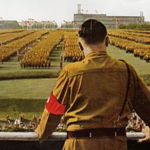Part 4 of the audiobook version of my Nietzsche and the Nazis: A Personal View.
Part 4. The Nazis in Power [mp3] [YouTube] [44 minutes]
 13. Political controls [mp3] [YouTube]
13. Political controls [mp3] [YouTube]
14. Education [mp3] [YouTube]
15. Censorship [mp3] [YouTube]
16. Eugenics [mp3] [YouTube]
17. Economic controls [mp3] [YouTube]
18. Militarization [mp3] [YouTube]
19. The Holocaust [mp3] [YouTube]
20. The question of Nazism’s philosophical roots [mp3] [YouTube]
Forthcoming:
 Part 5. Nietzsche’s Life and Influence
Part 5. Nietzsche’s Life and Influence
Part 6. Nietzsche against the Nazis
Part 7. Nietzsche as a Proto-Nazi
Part 8. Conclusion: Nazi and Anti-Nazi Philosophies
Previous:
Part 1. Introduction: Philosophy and History [mp3] [YouTube]
Part 2. Explaining Nazism Philosophically [mp3] [YouTube]
Part 3. National Socialist Philosophy [mp3] [YouTube]
Related:
The Nietzsche and the Nazis page.
Found the color in posted picture of Hitler surveying his legions chilling. That most of the images of that nightmare era are black and white tends to abstract and remove it somewhat from one’s immediate experience, lending it a “historical” flavor and distance. Harder to do with color.
I agree about the chilling, Ed. There’s a picture of Himmler with a child sitting on his knee, which always gives me the creeps when I see it.
Think I found it: the little blond girl? Yes, utterly chilling precisely because on the surface it isn’t. Himmler holds a dark fascination for me … those glasses and his demeanor make him look like a typical German intellectual of the time until one notes the uniform and watches the man at work…
http://www.thejc.com/files/imagecache/body_portrait/images/30062011-himmler.jpg
The girl is Gudrun Burwitz, his daughter. She remained a lifelong apologist for him and Nazi ideology.
Psychologist Alice Miller noted something I think is important to bear in mind when challenging those who hold pernicious belief systems. She related that after the war many decent Germans who had been children during that time, including some of her patients, found it very difficult to reconcile their benign childhood memories of Nazi pageantry, speeches, officialdom, etc., with the horrific realities they later learned.
I think the aesthetic, rituals, pageantry, etc., are important in indoctrination, particularly of the young. They become part of one’s holy childhood e.g. a girl’s first communion, her memories of her beautiful dress, etc. Later as adults some are able to disentangle their subjective childhood experience from the objective realities; too many, like Gudrun Burwitz aren’t.
It seems odd that no one sees that Hitler is dressed like a Boy Scout. The spirit of early National Socialism was to redeem German honor, and to fight Bolshevism to the death. Without jobs, money, and with very little hope, the Nazi ideas made more and more sense to Germans after the Wall St Crash in 1929, induced by central banking in America. Lenin shrewdly observed, “Without central banking socialism [i.e. The Marxist model] cannot succeed.” With the Soviet colossus breathing down the neck of Europe entire, what choice had one? Red or Dead? A slave of Moscow? Or, to be led by a charismatic Austrian demagogue? Most of those who denounce Fascism are closet Fascists themselves, most obviously, Liberals who will beat you up if you don’t condone their equalization politics (as long as their Kennedy-esque fortunes remain in tax-free trusts). If you are chilled by this, I daresay you might be thrilled to be in your Boy Scout attire, if your livelihood and nation were endangered by Asiatic hordes armed with the huge bludgeon of Marxist economic lies and Engels’ propaganda. As Ludwig von Mises pointed out, the Marxists never argue an economic point rationally, they smear the speaker, a standard Liberal tactic today.
Hitler and Goebbels acknowledged the power of the Lie — so big one could not easily refute it. But in much of their propaganda they were ruthlessly honest and to the point. No one could foresee the horrors which ensued, particularly at the war’s end. Half of Germany was starving, not just POWs or concentration camp inmates. It is a bit of propaganda-smearing also to decry Hitler, or Himmler, who genuinely liked children and dogs as demented because they fomented a world-shaking conflict. Wars on two fronts are not fought without typhus, cholera, dysentery, and malnutrition. The British invented the concentration camp in the Boer War, and thousands of women and children, incarcerated there to blackmail their courageous husbands, died of similar causes. No one can condone war, save for self-defense, yet, how easy that cause is to claim — Hitler believed, with good reason, that Stalin was but two years away from invading the West — what reason for such huge armies standing already in 1939 — and proven by his treatment of Finland, and the Baltic States. The Czar, although more autocratic, was not an invader type. Stalin had already murdered millions by the time of Hitler’s invasion — how often do the Holocaust screamers bring that up? Germany is no more guilty of war mongering that any other power — she just has better soldiers and a brutal honesty about European politics. Her philosophers tend to gloss over the German character, better represented by Arminius than by Wilhelm II.